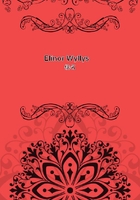
第156章
"------- But by the stealth Of our own vanity, we're left so poor."
HABINGTON.
{William Habington (English poet and dramatist, 1605-1664), "Castara" I.20-21}
Now that Harry had left the house, Mrs. Creighton's attention was chiefly given to Mr. Wyllys; although she had as usual, smiles, both arch and sweet, sayings, both piquant and agreeable, for each and all of the gentlemen from Broadlawn, who were frequent visiters at Wyllys-Roof. Mr. Stryker, indeed, was there half the time. It was evident that the lady was extremely interested in Hazlehurst's difficulties; she was constant in her inquiries as to the progress of affairs, and listened anxiously to the many different prognostics as to the result. Miss Agnes remarked indeed, one day, when Mr. Ellsworth thought he had succeeded in obtaining an all-important clue, in tracing the previous career of Harry's opponent, that his sister seemed much elated--she sent an extremely amiable message to Hazlehurst in her brother's letter. It afterwards appeared, however, on farther inquiry, that this very point turned out entirely in favour of the sailor, actually proving that nine years previously he had sailed in one of the Havre packets, under the name of William Stanley. Mrs. Creighton that evening expressed her good wishes for Harry, in a much calmer tone, before a roomfull {sic} of company.
"Ladies, have you no sympathizing message for Hazlehurst?" inquired Mr. Ellsworth, as he folded a letter he had been writing.
"Oh, certainly; we were sorry to hear the bad news;" and she then turned immediately, and began an animated, laughing conversation with Hubert de Vaux.
'What a difference in character between the brother and sister,' thought Miss Agnes, whose good opinion of Mr. Ellsworth had been raised higher than ever, by the earnest devotion to his friend's interest, which appeared throughout his whole management of the case.
The family at Wyllys-Roof were careful to show, by their friendly attention to the Hubbards, that their respect and regard for them had not suffered at all by the steps Mr. Clapp had taken. Miss Agnes and Elinor visited the cottage as frequently as ever. One morning, shortly after the wedding, Miss Wyllys went to inquire after Mrs. Hubbard, as she was in the habit of doing. She found Mary Hubbard, the youngest daughter, there, and was struck on entering, by the expression of Miss Patsey's face--very different from her usual calm, pleasant aspect.
"Oh, Miss Wyllys!" she exclaimed, in answer to an inquiry of Miss Agnes's--"I am just going to Longbridge! My poor, kind uncle Joseph!--but he was always too weak and indulgent to those girls!"
"What has happened?" asked Miss Wyllys, anxiously.
"Dreadful news, indeed; Mrs. Hilson has disgraced herself!--Her husband has left her and applied for a divorce! But I do not believe it is half as bad as most people think; Julianna has been shamefully imprudent, but I cannot think her guilty!"
{"Her husband has left her..." = this incident seems to reflect the unhappy marriage between Henry Nicholas Cruger (1800-1867) -- a close friend of the Cooper family -- and the free-wheeling Harriet Douglas (1790-1872). After their 1833 marriage, Harriet Douglas insisted on living her own life -- often in Europe; Cruger eventually left her and in 1843 began a lengthy and highly public divorce action based on desertion. The Cooper family strongly disapproved of Harriet Douglas, and she is believed to have been an inspiration for the free-wheeling Mary Monson in James Fenimore Cooper's last novel, "The Ways of the Hour" (1850)}
Miss Wyllys was grieved to hear such a bad account of her old neighbour's daughter.
"Her husband has left her, you say; where is she now?"
"Her father brought her home with him. He went after her to Newport, where she had gone in the same party with this man--this Mr. de Montbrun, and a person who lives in the same boarding-house, a Mrs. Bagman, who has done a great deal of harm to Julianna."
"Sad, indeed!" exclaimed Miss Agnes.
"Charles says it is heart-rending, to see my poor uncle, who was so proud of his good name--thought so much of his daughters!
Often have I heard him say: 'Let them enjoy life, Patsey, while they are young; girls can't do much harm; I love to see them look pretty and merry.' They never received any solid instruction, and since her marriage, Julianna seems to have been in bad company.
She had no children to think about, and Mr. Hilson's time is always given to his business; her head was full of nonsense from morning till night; I was afraid no good would come of it."
"It is at least a great point, that she should have come back with her father."
"Yes, indeed; I am thankful for it, from the bottom of my heart.
Oh, Miss Wyllys, what a dreadful thing it is, to see young people going on, from one bad way to another!" exclaimed Miss Patsey.
"We must hope that her eyes will be opened, now."
"If she had only taken warning from what Charles told her about this Mr. de Montbrun; he had seen him at Rome, and though he had no positive proofs, knew he was a bad man, and told Mrs. Hilson so. It is surely wrong, Miss Wyllys, to let all kinds of strangers from foreign countries into our families, without knowing anything about them."
"I have often thought it very wrong," said Miss Agnes, earnestly.
"But Mrs. Hilson wouldn't believe a word Charles said. She talked a great deal about aristocratic fashions; said she wouldn't be a slave to prudish notions--just as she always talks."
"Where was her husband, all this time?"